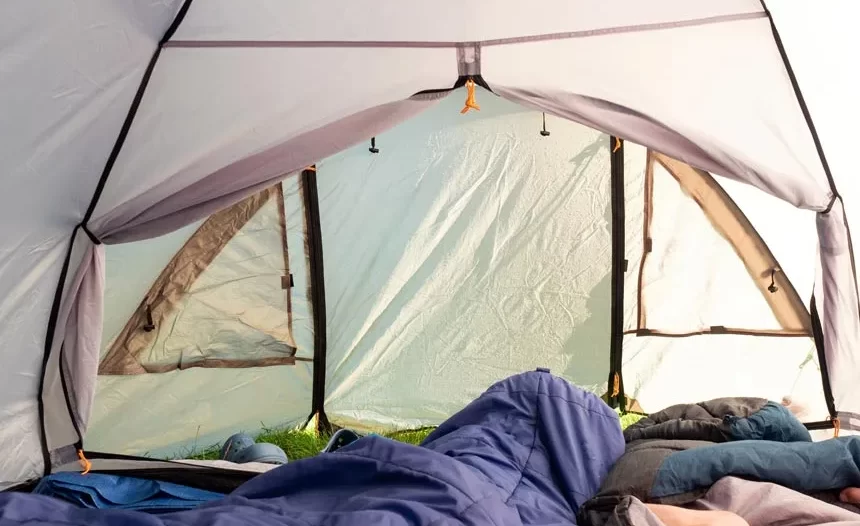Many people choose to live in tents permanently for a variety of reasons. Some people are “tent people” who just love being outdoors and feel more comfortable living in a tent than in a traditional home. Others may be trying to save money or live a simpler lifestyle.
And still, others may be living in a tent because they don’t have any other choice – they may be homeless, or a natural disaster may have destroyed their home.
Whatever the reason, it is possible to live in a tent permanently. But it takes some planning, preparation, and legal considerations too, depending on where you live.
In this post, we’ll explore everything you need to know about living in a tent permanently, from how to set up your campsite to what kind of supplies and gear you’ll need. We’ll also touch on some of the legal considerations of living in a tent.
Table of Contents
Is It Legal to Live in a Tent on Any Land?
The answer to this question will depend on where you live, as different states and countries have different laws regarding camping and living outdoors.
In the United States, federal laws protect your right to camp on your land. But in some states, like Alabama, you need to get a permit from the health department to live in a tent permanently. And in other states, like California, it’s illegal to camp on your own land unless you have permission from the land owner.
What About Camping on My Own Property?
The short answer is, it depends.
If you own the land outright, then you have the right to do whatever you want on your ground, including living in a tent permanently. However, if you’re renting or leasing the land, you’ll need to check with your landlord or leasing company to see if they allow tenants to live in tents.
In some cases, even if you own the land, there may be city or county ordinances that prohibit camping or living in a tent on your property. So it’s always best to check with your local government before setting up camp.
How Do You Decide If Living in a Tent Is Right for You?
Living in a tent permanently is not for everyone. It takes a special type of person to be able to live outdoors full-time, and not everyone is cut out for it.
Here are some things to consider before deciding to live in a tent permanently:
- Are you comfortable with living in close quarters? Tents are small spaces, and you’ll likely be sharing your tent with other people if you live in one permanently. If you’re someone who needs their own space and doesn’t do well in close quarters, then living in a tent might not be the best option for you.
- Is it possible for you to live without basic facilities? When you live in a tent, you’re giving up all of the comforts of typical houses, such as running water, electricity, and indoor plumbing. If you’re not comfortable living without these things, then living in a tent is probably not suitable for you.
- Are you prepared to deal with bad weather? When you live in a tent, you’re at the mercy of the elements. That means you’ll have to deal with whatever Mother Nature throws your way, whether it’s extreme heat, cold temperatures, rain, snow, or high winds. If you’re not willing to face the difficulties of outdoor living, a tent may not be the best choice for you.
- Can you live in the woods without getting bored? You’re most likely camping in rural areas, which means you’ll be away from civilization. Living in a tent may not be your best solution if you get bored easily or need to be around others to feel happy.
- If the idea of insects and other pests crawling around your home gives you the creeps, then maybe living in a tent is not for you. When you live in close quarters with nature, expect to see (and hear) some critters from time to time.
What Preparations Are Necessary Before Living Permanently in a Tent?
If you’ve decided that living in a tent permanently is right for you, then there are some preparations you need to make before making a move.
Here are some things to consider before moving into a tent:
1. Find the Right Location
The first step is to find a suitable location for your campsite. You’ll want to find a secluded spot but not too far from civilization, has access to water, and is large enough to accommodate your tent and all of your gear.
2. Choose a Right Tent
Not all tents are created equal. When choosing a tent to live in permanently, you’ll want to make sure it’s big enough for all of your belongings and is made from durable materials that can withstand the elements. In that case, we advise you to go for a canvas tent as it is the most suitable one for this type of living.
3. Zoning Laws and Regulations
Once you’ve found the perfect spot for your campsite, the next step is to check with your local government to see if any zoning laws or regulations would prohibit you from camping there.
4. Gather the Right Gear
Of course, you’ll need to have the right gear before you can live in a tent permanently. In addition to a tent, you’ll need sleeping bags, chairs, a camp stove, lanterns, and other essential camping gear.
5. Proper Water Supply
One of the most important things you’ll need for your campsite is a proper water supply. You’ll need to find a source of fresh water, either from a river, stream, or spring, and you’ll need to have a way to purify it before drinking.
6. Create a Budget
You’ll need to create a budget for your new lifestyle. When you live in a tent, you won’t have many of the expenses that come with a traditional home, such as a mortgage or rent, but there are still some costs associated with camping, such as gear, food, and permits.
7. Waste Management
You’ll also need to have a plan for dealing with your waste. This includes human waste, as well as garbage and recycling. You may need to dig a latrine or set up some sort of makeshift outhouse for your campsite.
8. Food Storage
Another important consideration is food storage. While living in a tent, you won’t have a refrigerator or pantry to store food in, so you’ll need to find other ways to keep your food fresh and safe to eat. This may include using a cooler or investing in some freeze-dried food.
9. Stock Up on Supplies
Before moving into your tent, you’ll also need to stock up on supplies like food, water, and firewood. It’s a good idea to have enough supplies to last at least a week in case you’re unable to leave your campsite for any reason.
10. Create an Emergency Plan
Last but not least, you should create an emergency plan if something goes wrong while living in your tent. Make sure you know how to contact emergency services and plan what to do if you’re injured or need to evacuate your campsite.
How to Set Up Tents?
Once you’ve gathered all the necessary gear, it’s time to set up your tent.
Here are some tips for setting up your tent:
1. Choose a level spot for your campsite. You’ll want to ensure your tent is on a firm and level surface to prevent it from wobbling or collapsing.
2. If possible, find a spot that’s sheltered from the wind. This will help keep your tent stable in case of bad weather.
3. Clear away any debris from the area where you’ll be setting up your tent. This includes sticks, stones, and leaves.
4. Stake down the corners of your tent. This will help hold it in place and prevent it from blowing away in the wind.
5. Set up your camp stove and lanterns. This will provide light and heat for your campsite.
6. Bring in any furniture or gear you’ll need for your campsite. This may include chairs, a table, or a cooler.
7. Hang any mosquito nets or tarps you have to keep insects out of your campsite.
8. Fill empty containers with fresh water from a nearby river, stream, or spring.
9. Ensure all your food is stored correctly to prevent attracting animals to your campsite.
Does Tent Living Have Any Advantages?
Absolutely! Although it may not be for everyone, living in a tent permanently has plenty of advantages. Here are some of the benefits of living in a tent:
1. Save Money
One of the biggest advantages of living in a tent is saving money. When you don’t have to pay rent or a mortgage, you can use that money to save up for other things, such as travel or retirement.
2. Simplify Your Life
Another advantage of living in a tent is that it can help simplify your life. You can live a simpler and more minimalist lifestyle when you don’t have all the stuff that comes with a traditional home. It can lead to less stress and more happiness.
3. More Connected to Nature
Living in a tent makes you automatically more connected to nature. This can lead to a deeper appreciation for the natural world and help you feel more connected to the planet.
4. More Freedom
Living in a tent can also give you a sense of freedom that you can’t get from living in a traditional home. You can pick up and move whenever you want when you’re not tied to a mortgage or rent. This can be great for people who love to travel or who don’t like being tied down to one place.
Conclusion
So, can you live in a tent permanently? The answer is a resounding Yes, apart from law and order issues. With a bit of creativity and elbow grease, living in a tent can be comfortable, fun, and accessible.
There are many benefits to ditching traditional housing in favor of a life in a tent. Of course, some challenges come with this lifestyle, like dealing with bad weather and finding places to camp that are legal and safe. But for those willing to do the work, living in a tent permanently can be an advantageous experience.



